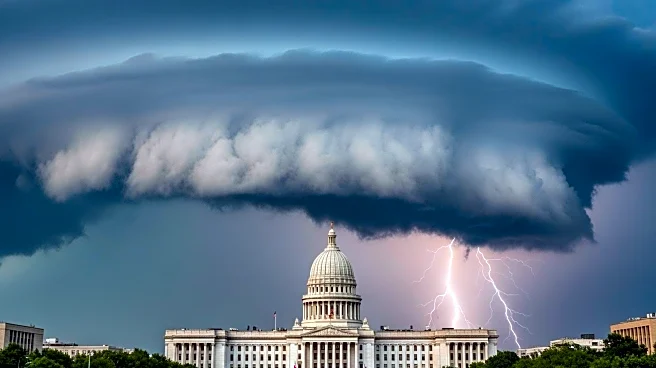What is the story about?
What's Happening?
Senator Ted Budd from North Carolina has expressed strong dissatisfaction with the Department of Homeland Security (DHS) and the Federal Emergency Management Agency (FEMA) over the slow distribution of funds for Hurricane Helene recovery. Budd has announced his intention to use his position to stall DHS nominees until the issue is resolved. He voted to filibuster a top DHS official, Robert Law, in a failed attempt to block his appointment as under secretary for strategy, policy, and plans. Budd's main concern is the policy requiring DHS Secretary Kristi Noem to personally approve expenditures over $100,000, which he believes is causing delays in fund distribution. Budd has been trying to arrange a meeting with Noem to discuss changing this policy, but has faced difficulties in doing so.
Why It's Important?
The delay in hurricane relief funds has significant implications for the affected communities in North Carolina, which are still recovering from the devastation caused by Hurricane Helene. Budd's actions highlight the political tensions surrounding disaster relief and the bureaucratic hurdles that can impede timely assistance. The senator's threat to stall DHS nominees could impact the department's operations and its ability to implement policies effectively. This situation underscores the importance of efficient government response in disaster management and the potential consequences of administrative bottlenecks.
What's Next?
Senator Budd plans to continue placing holds on all DHS nominees until he receives a satisfactory response regarding the outstanding invoices for hurricane relief. This could lead to further political negotiations and pressure on DHS to expedite the approval process for funds. The ongoing dialogue between Budd and DHS may result in policy changes to streamline the approval of disaster relief expenditures. Stakeholders, including local governments and affected residents, will be closely monitoring these developments.
Beyond the Headlines
The situation raises broader questions about the balance between fiscal accountability and the need for rapid disaster response. Secretary Noem's policy aims to ensure taxpayer money is spent responsibly, but it may inadvertently slow down critical aid. This case could prompt discussions on how to improve disaster relief processes while maintaining financial oversight. Additionally, the political dynamics between federal agencies and lawmakers could influence future disaster management strategies.
















